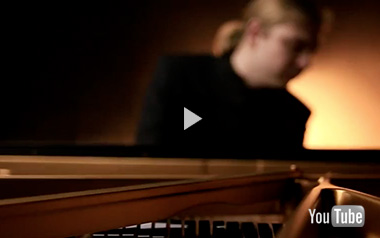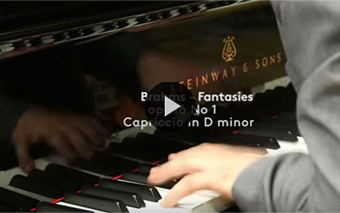Next Concerts
February 19, 2026
Odense
Odense C, Denmark
Ravel: Piano Concerto in G major, M.83
– Pierre Bleuse (conductor)
Venue: Odense Concert Hall, Odense
Mar 7, 2026
Netherlands Philharmonic / European Tour
Amsterdam, Netherlands
Brahms: Piano Concerto No.2 in B-flat major, Op.83
– Lorenzo Viotti (conductor)
Venue: The Concertgebouw, Amsterdam
REVIEWS
Dec 07 2017
Tchaikovsky Piano Concerto No. 1 / BBC Scottish Symphony Orchestra cond. Vedernikov
Denis Kozhukhin was the soloist, giving a performance of crystalline clarity that downplayed the sentimentality in favour of understated lyricism, but with plenty of bravura power where it was needed.
Dec 07 2017
Tchaikovsky Piano Concerto No. 1 / BBC Scottish Symphony Orchestra cond. Vedernikov
“Pianist Denis Kozhukhin has been a regular and much-admired visitor to the BBC SSO, and his account of Tchaikovsky’s well-loved First Piano Concerto was big-boned, urgent, sometimes rather breathless, but so mighty as to sweep aside any concerns. He tackled the work’s relentless virtuosity with what felt like elegant choreography, and a fair bit of rhythmic freedom too. But there was a steely determination to his playing, matched brilliantly in the Orchestra’s forthright, sharply defined playing.”
THE SCOTSMAN
Nov 21 2017
Amsterdam Concertgebouw Recital
“For the extremely talented Russian pianist Dennis Kozhukhin (1986), born and raised in a musical family in Nizhni Novgorod, the ongoing strive for the highest possible quality is a natural goal, hard work is the way to reach that goal and success is nothing more than a pleasant addition.
After Kozhukhin, who now played for the Third time in the master pianists series, won the Queen Elisabeth Competition in 2010, he instantly became an international star without starlike airs. This Prize made it possible for him to worldwide do what he loves to do most: doing justice to the composer who’s music he is playing and searching for the “ideal balance between the emotional and the intellectual”. That this balance can be different for every musician within the same piece, is for Kozhukhin “the beauty of classical music”.
Musicality seems for Kozhukhin a natural gift, but apart from that, he is also a sharp analyst of the works he plays, and a very gifted instrumentalist. During his study at the Balakirev School of Music and later on at the Escuela Superior de Música Reina Sofia, where he was taught by, amongst others, Dmitri Bashkirov, he must have studied so hard that he has mastered the “craft” of piano playing completely. On stage, Kozhukhin seems to coincide with the music and the piano, without an ego and without placing himself in the spotlight.
But it’s really not the case that Kozhukhin has nothing to say, because it is due to his empathy, intelligence and imagination, that this pianist seems to have the secret key that provides him access to the specific, inner richness of a score. Kozhukhin opens the gate and takes his audience with him on a fascinating musically expedition, in which time doesn’t matter, sounds become monumental architectures, style features organically shape to the rhythm and dynamics of the notes, emotions manifest themselves in a rainbow of delicate colour shades, every detail of the articulation gets clear contours, melodic lines flow like rivers and light and dark shades glide over one and other like leaves in the wind.
Inwardly Kozhukhin seems very sure of his mastering the musical matter, and he easily seem to conquer every obstacle that could work in the disadvantage of the composer he performs. He doesn’t speed up when being nervous, doesn’t show empty (meaningless) virtuosity and doesn’t scream over-emotional or hysterical what can be said in clear no-nonsense language.
For each composer, he creates its own universe, in which integrity and nobleness rule, creating a nice world to be in.
Kozhukhins striking interpretation of Händels Suite no. 7 in g, evoked the image of a abundant palace garden from the 18th century, that has lovely singing birds hidden in the rosebushes and in which a royal company is strolling through the garden looking at the rosebuds and blossoms, smelling the fresh Spring air.
A completely different mood was evoked with Kozhukhin’s dreamingly and melancholic interpretations of the 3 Intermezzi op. 117 by Brahms, in which everything evolved around contemplation, fall-like images and the sadness of old age.
This was followed by a hallucinating interpretation of Bartok’s rarely played Out of Doors, Sz. 81, in which burlesque dances with wild and biting rhythms was alternated with fascinating vague panorama’s in the cosmos. Kozhukhins unique colour pallet that he used for Bartok was so hypnotizing, that it sometimes seemed as if he could really reveal other dimensions present in the Concertgebouw.
Also Debussy had it’s own special sound. His 12 Préludes from Book 1 went by, like under water panorama’s, seen through a symbolic boat made of glass, pushed forward by the wind and floating on the movements of the water. That caused a dreamingly game of reflection played by the light reflecting the water surface and the breaking of this surface by shadows coming from the deep, sometimes turning out to be a silver coloured group of fishes, sometimes scary monsters, all moving under the water surface.
Kozhukhin ended his varied solo recital with a refined interpretation of Gershwins Rhapsody in Blue, which had a jazzy tempo and articulation, a sensual sound but foremost was a captivating experience due to the pleasure with which Kozhukhin played Gershwin’s ‘blue’ notes. After that he played 2 beautiful encores by Rachmaninoff and Grieg.” – meesterpianisten.nl
Nov 21 2017
Rachmaninov’s Rhapsody on a Paganini Theme / Philharmonia Orchestra cond. Rouvali
Jul 22 2017
Bartok Piano Concerto No. 2 / London Symphony cond. Sir Simon Rattle
“Kozhukhin’s calm and unassuming demeanour belied the powerful and uncompromising nature of this work, but quickly revealed an inner intensity and conviction. The Stravinskian outer movements were jagged and relentless, with punchy winds, brass and percussion all masterfully controlled by Rattle. Kozhukhin pounded aggressively through the rhythmic labyrinths, displaying the piano’s percussive elements exactly as the composer intended. But there was deftness too, particularly in the ‘night-music’ of the second movement, with Kozhukhin threading through the fog with delicacy and mystery before the bass drum rudely heralded a quite brilliant third movement.” – Bachtrack
“Bartók’s Piano Concerto No 2, a slippery work with a remarkably relaxed soloist, Denis Kozhukhin, who tripped through a hair-raising part with no-fuss dexterity.“ – The Times
“…Denis Kozhukhin the fearless soloist” – Evening Standard
“[Denis Kozhukhin] dispatched the fiendish solo part with the air of a conquering hero.” – Financial Times
Jul 13 2017
Rachmaninov Concerto No. 1 / Staatskapelle Berlin cond. Barenboim
“Denis Kozhukhin in complete unity with Barenboim”
“Daniel Barenboim, who originally was to continue his Rachmaninoff piano concert cycle with Lang Lang, could find a more than adequate replacement: Denis Kozhukhin, the Russian pianist, who already created a stir two years ago, when he stepped in for Martha Argerich during Barenboim’s Staatsoper-Festtage. Since then, the 30-year-old seems to enjoy the confidence of the Maestro, and is one of the musical friends Barenboim likes to invite to the Boulez-Saal. Yet the fact that Kozhukhin is in a position to shake off Rachmaninoff’s almost unknown, difficult first piano concerto within such a short time, is a wondrous surprise.”
“This time the pianist shows a different face – that of a wild virtuoso. Already at the start of the F-Sharp-Minor Rachmaninov Concerto – a twisted mixture of Tchaikovsky fanfares of fate and the launch of the Grieg Concerto – he succeeds in a sweeping manner through head-over-heels tempi that remind of the legendary Rachmaninoff recordings of the American Earl Wild. However, Kozhukhin is not a hotrod, and his loud hissing and wheezing in the highest fortissimo excitement should not overshadow how intelligent and differentiated his piano playing is. Depending on the circumstance, Kozhukhin can play with force, exude lyrical warmth or fascinate with clarity. He confidently leads the Staatskapelle at all times.”
Berliner Morgenpost, June 2017
“Pianist Denis Kozhukhin delivers another highlight with the first piano concerto by Sergei Rachmaninov. Powerful, and at the same time easy -“cool” might be the right expression – he casts the underestimated early work. It stands in the shadow of “Rach 2”, although it has the most beautiful middle movement of the four piano concertos by the Russian late-romantic, which moves from its phantasy quality straight into the virtuoso finale. In the process, Kozhukhin hardly manages to stay on the stool, and brings the concerto to a grandiose conclusion nearly standing up. Barenboim’s embrace afterwards expresses enthusiasm, and perhaps also thanks for having represented the injured Lang Lang with bravura.”
Tagesspiegel, June 2017
Jul 06 2017
Rachmaninov Piano Concerto No. 2 / Philharmonia Orchestra cond. Y. Temirkanov
“…Denis Kozhukhin was in terrific shape, confirming his place as one the very finest pianists of his generation (he’s about thirty now), a flawless technique serving the music’s direction, ebb and flow, strength and delicacy, all cohesively bonded without exaggeration and backed to the hilt by the Philharmonia. After such a freshly-painted account, full of character, discretion, rapture and electricity, an encore from Kozhukhin was welcome, a sensitive and spacious reading of the first of Brahms’s Opus 117 Piano Pieces…” Read more on classicalsource.com


